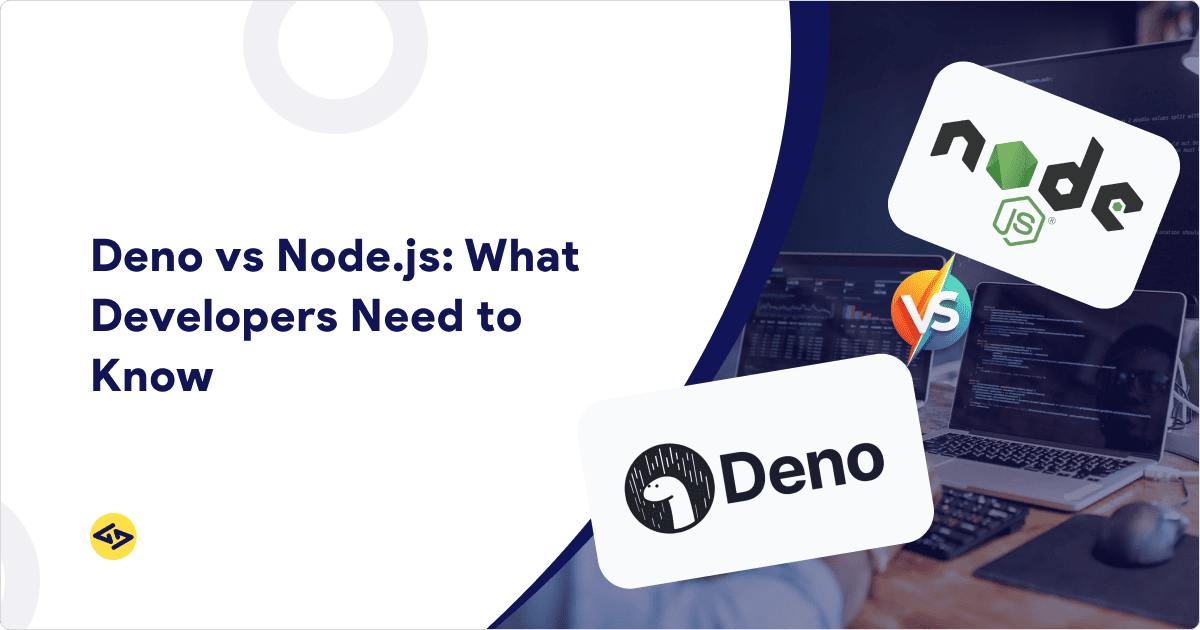Node.js continues to dominate modern web development in 2024, powering over 30 million websites and serving as the backbone for industry giants like Netflix, LinkedIn, PayPal, and Uber. Its non-blocking, event-driven architecture makes it the go-to choice for building fast, scalable applications that handle millions of concurrent users.
But here’s the reality: hiring Node.js developers who genuinely deliver results isn’t straightforward. The talent pool is competitive, skill levels vary dramatically, and one wrong hire can derail your project timeline, inflate budgets, and create technical debt that lingers for years.
Many businesses struggle with:
- Limited qualified talent: Experienced Node.js developers remain in exceptionally high demand
- Varied skill levels: Candidates may know JavaScript but lack deep server-side expertise
- Risk of hiring mistakes: Wrong hires lead to project delays, performance issues, and additional costs
This comprehensive Node.js developer hiring guide walks you through everything you need—from essential NodeJS development skills to critical red flags when hiring Node.js developers. Whether you’re a startup founder scaling your first product or an enterprise CTO modernizing legacy systems, you’ll learn exactly how to hire a Node.js developer who fits your technical requirements and team culture.
Understanding Node.js and Its Use Cases
What Is Node.js and Why It’s Popular
Node.js is an open-source, cross-platform JavaScript runtime environment built on Chrome’s V8 engine. Unlike traditional server-side technologies, Node.js executes JavaScript code outside a web browser, enabling developers to use a single language across the entire application stack.
Its popularity stems from several key advantages:
- Non-blocking I/O model: Handles thousands of concurrent connections efficiently
- Single programming language: JavaScript on both frontend and backend reduces context-switching
- Massive ecosystem: npm hosts over 2.1 million packages as of 2024, accelerating development
- Active community: Continuous updates, security patches, and community-driven improvements
Typical Projects That Require Node.js Developers
When you hire Node.js developers, they typically build:
| Project Type | Examples | Why Node.js Excels |
| Real-time Applications | Chat apps, collaboration tools, gaming platforms | WebSocket support, low latency |
| RESTful APIs & Microservices | Backend services for mobile/web apps | Lightweight, fast request handling |
| Streaming Services | Video/audio platforms, live broadcasting | Efficient data streaming capabilities |
| E-commerce Platforms | Shopping carts, payment processing | High concurrency, scalability |
| IoT Applications | Device management, data collection | Event-driven architecture |
Benefits of Using Node.js for Businesses
- Faster time-to-market: Shared codebase reduces development cycles by up to 40%
- Cost efficiency: Fewer developers needed when JavaScript spans the entire stack
- Scalability: Horizontal scaling handles traffic spikes seamlessly
- High performance: Event-driven model processes requests faster than traditional threaded approaches
Key Skills to Look for in a Node.js Developer
Understanding essential Node.js developer qualifications helps you identify top talent quickly. Here’s your comprehensive Node.js developer checklist:
Technical Skills
JavaScript & Node.js Mastery
JavaScript proficiency is non-negotiable. Your candidate should demonstrate deep understanding of:
- ES6+ features (arrow functions, destructuring, async/await)
- Closures, promises, and prototypal inheritance
- The Node.js runtime environment and its core modules
Asynchronous Programming & Event-Driven Architecture
Node.js thrives on non-blocking operations. Strong candidates confidently explain:
- The event loop mechanism and how it processes callbacks
- Differences between callbacks, promises, and async/await
- Error handling in asynchronous code
- Stream processing and buffer management
Backend Frameworks Expertise
Proficiency in popular frameworks indicates practical experience:
- Express.js: Most widely adopted, lightweight and flexible
- NestJS: TypeScript-based, enterprise-grade architecture
- Koa.js: Modern, modular approach by Express creators
- Fastify: High-performance alternative with excellent plugin ecosystem
Database Knowledge
Strong backend developer skills include experience with:
- NoSQL: MongoDB, Redis, DynamoDB
- SQL: PostgreSQL, MySQL, MariaDB
- ORMs: Sequelize, TypeORM, Prisma, Mongoose
- Database optimization, indexing, and query performance
API Development and Integration
Core Node.js developer responsibilities include:
- Building RESTful APIs with proper HTTP methods and status codes
- GraphQL implementation and schema design
- Third-party API integrations (payment gateways, social logins)
- API authentication (JWT, OAuth 2.0, API keys)
- Rate limiting, caching, and security best practices
Testing, Debugging, and Optimization
Production-ready developers demonstrate:
- Unit testing with Jest, Mocha, or Chai
- Integration and end-to-end testing strategies
- Debugging using Node.js inspector, Chrome DevTools
- Performance profiling and memory leak detection
Soft Skills
Problem-Solving and Debugging Abilities
Technical prowess means little without efficient issue diagnosis. Ask about their debugging approach, tools they use, and how they’ve solved complex problems.
Team Collaboration and Communication
Effective developers communicate clearly, participate in code reviews constructively, and work seamlessly with cross-functional teams, including designers, product managers, and QA.
Adaptability to New Technologies
The JavaScript ecosystem evolves rapidly. Top developers stay current with emerging tools, libraries, and Node.js project best practices through continuous learning.
Experience and Qualification Requirements
When evaluating Node.js developer experience, consider these benchmarks:
Years of Experience in Node.js and Backend Development
| Level | Experience | Suitable For | Typical Responsibilities |
| Junior | 0-2 years | Simple features, bug fixes | Writing code under supervision, learning patterns |
| Mid-Level | 2-5 years | Full feature development | Independent feature delivery, code reviews |
| Senior | 5+ years | Architecture, leadership | System design, mentoring, technical decisions |
| Lead/Architect | 7+ years | Strategic planning | Team leadership, technology strategy |
Portfolio and GitHub Contributions
Active GitHub profiles reveal coding style, project complexity, and community involvement. Look for:
- Clean, well-documented repositories with clear README files
- Consistent commit history showing regular development activity
- Open-source contributions demonstrating collaboration skills
- Code organization reflecting professional standards
- Test coverage indicating quality-focused development
Previous Project Types and Domain Experience
Experience in your industry reduces ramp-up time significantly:
- Fintech: Payment processing, compliance, security protocols
- Healthcare: HIPAA compliance, data privacy, integration standards
- E-commerce: High-traffic handling, inventory systems, checkout flows
- SaaS: Multi-tenancy, subscription management, API design
Familiarity with Cloud Services and DevOps
Modern Node.js developer qualifications increasingly include:
- Cloud Platforms: AWS (Lambda, EC2, S3), Azure, Google Cloud Platform
- Containerization: Docker, Kubernetes, container orchestration
- CI/CD Pipelines: GitHub Actions, Jenkins, CircleCI, GitLab CI
- Monitoring: PM2, New Relic, Datadog, Application Insights
- Infrastructure as Code: Terraform, CloudFormation
How to Effectively Source Node.js Developers
Knowing how to find Node.js developers is crucial for building your team efficiently.
Freelancers vs. Full-Time vs. Outsourced Teams
| Hiring Model | Best For | Pros | Cons |
| Freelance Node.js developer | Short-term projects, specific features | Flexibility, cost control | Management overhead, availability |
| Full-time hire | Long-term product development | Dedication, team integration | Higher costs, longer hiring process |
| Remote Node.js developer | Global talent access, cost optimization | Wider talent pool, flexibility | Time zones, communication |
| Outsourced teams | Complete project delivery | Faster scaling, reduced management | Less control, quality variance |
Platforms to Find Node.js Developers
Professional Networks:
- LinkedIn: Targeted job postings, direct outreach, professional vetting
- GitHub: Evaluate code directly, reach developers through contributions
Freelance Platforms:
- Toptal: Pre-vetted top 3% developers, rigorous screening
- Upwork: Large talent pool, varied experience levels, verified reviews
- Arc.dev: Remote-focused, technical vetting included
Developer Communities:
- Stack Overflow Jobs: Engaged developer community
- AngelList/Wellfound: Startup-focused talent pool
- Dev.to: Community engagement and job postings
Tips for Evaluating Resumes and Portfolios
Effective Node.js recruitment tips:
Verify claimed technologies through specific project examples
Look for progression in complexity across projects
Check consistency between resume claims and portfolio evidence
Request code samples or live project demonstrations
Validate client testimonials and professional references
Assess problem-solution-outcome case studies
Interview Questions and Assessment Tips
Strategic Node.js developer interview questions reveal true competency beyond resume claims.
Sample Technical Interview Questions
Fundamental Understanding:
1. “Explain the Node.js event loop and how it handles asynchronous operations.”
— Tests core runtime knowledge
2. “What’s the difference between process.nextTick() and setImmediate()?”
— Assesses deep event loop understanding
3. “How does Node.js handle child processes, and when would you use them?”
— Evaluates advanced Node.js concepts
Practical Application:
4. “How would you implement error handling in an Express.js application?”
— Tests framework expertise and best practices
5. “Describe your approach to preventing memory leaks in Node.js applications.”
— Reveals production experience
6. “Walk me through designing a RESTful API for a user authentication system.”
— Assesses system design thinking
Problem-Solving:
7. “How would you optimize a Node.js application experiencing slow response times?”
— Tests debugging and optimization skills
8. “Explain how you’d implement rate limiting for an API.”
— Evaluates security awareness
Coding Tests and Real-World Problem Assessments
- Take-home projects: 3-4 hour realistic tasks reflecting actual work
- Live coding sessions: Observe problem-solving approach in real-time
- Code review exercises: Evaluate ability to identify issues and suggest improvements
- System design discussions: Assess architectural thinking and scalability awareness
Pro Tip: Focus on evaluating the problem-solving process, communication during coding, and code quality—not just whether they reach the correct answer.
Evaluating Problem-Solving and Coding Efficiency
Strong candidates demonstrate:
- Clear thought process articulation before coding
- Clean, readable code with meaningful variable names
- Consideration of edge cases and error handling
- Awareness of time and space complexity
- Willingness to refactor and improve solutions
Red Flags to Watch Out For
Recognizing warning signs saves costly hiring mistakes. Here are critical red flags when hiring Node.js developers:
Lack of Understanding of Core Node.js Concepts
If candidates struggle to explain:
- How the event loop processes asynchronous operations
- Differences between synchronous and asynchronous code
- Basic error handling patterns in Node.js
- The module system and how require/import works
…they likely lack the foundational knowledge for production-level work.
Poor Communication or Teamwork Skills
Warning signs include:
- Inability to explain technical concepts in simple terms
- Defensive or dismissive attitude toward questions
- No experience with code reviews or collaborative development
- Resistance to feedback or alternative approaches
- Vague responses about team dynamics in previous roles
Overstating Experience or Showing No Portfolio
Be cautious when candidates:
- Claim extensive experience but can’t discuss specific technical challenges
- Have no GitHub activity, code samples, or portfolio to share
- Cannot clearly explain their role versus team contributions
- Provide inconsistent answers about technologies used
- List technologies they’ve “worked with” but can’t demonstrate proficiency
Inability to Write Clean, Maintainable, and Scalable Code
During technical assessments, watch for:
- Poorly named variables and functions
- No error handling or edge case consideration
- Lack of code organization and structure
- Ignoring security best practices
- No awareness of testing or documentation
- Copy-paste solutions without understanding
Additional Warning Signs
- Unfamiliarity with version control: Git basics should be second nature
- No testing knowledge: Indicates lack of professional development experience
- Resistance to learning: Technology evolves; adaptability is essential
- Failed practical assessments: Theory without application raises concerns
Cost & Hiring Considerations
Understanding market rates helps you budget appropriately and set realistic expectations.
Average Node.js Developer Salary by Region
| Region | Annual Salary (Full-time) | Hourly Rate (Freelance) |
| United States | $120,000 – $180,000 | $80 – $150+ |
| Western Europe | $75,000 – $130,000 | $55 – $110 |
| Eastern Europe | $45,000 – $80,000 | $35 – $70 |
| South Asia | $25,000 – $55,000 | $20 – $50 |
| Latin America | $40,000 – $75,000 | $35 – $65 |
Note: Rates vary based on experience level, specialization, and company size.
Factors Affecting Cost
- Experience level: Senior developers and architects command premium rates
- Specialization: Real-time systems, microservices, or fintech expertise costs more
- Location: Geographic salary differences remain significant despite remote work
- Project complexity: Enterprise-scale applications require higher investment
- Engagement type: Full-time benefits add 20-30% to base salary costs
Hiring Strategy Tips for Startups vs. Enterprises
For Startups:
- Consider full-stack Node.js developer hiring for maximum versatility
- Start with contractors to validate product-market fit before committing
- Prioritize problem-solving skills and adaptability over credentials
- Look for developers comfortable with ambiguity and rapid iteration
For Enterprises:
- Invest in senior architects for technical leadership and standards
- Build balanced teams mixing experience levels for knowledge transfer
- Consider dedicated teams for mission-critical projects
- Establish clear evaluation criteria aligned with organizational standards
Best Practices for Onboarding Node.js Developers
Successful JavaScript developer hiring extends far beyond the offer letter. Proper onboarding sets developers up for long-term success.
Setting Clear Expectations and Deliverables
- Document coding standards, style guides, and architectural patterns
- Define clear project milestones, KPIs, and success metrics
- Establish communication protocols and meeting cadences
- Clarify Node.js developer responsibilities and decision-making authority
- Provide access to product roadmaps and business context
Integrating Them into Your Team Workflow
- Pair new hires with experienced team members for knowledge transfer
- Schedule introductory sessions with key stakeholders across departments
- Provide comprehensive access to tools, documentation, and resources
- Allow dedicated time for codebase familiarization (typically 1-2 weeks)
- Assign initial tasks that provide quick wins while learning the system
Tools and Platforms for Smooth Collaboration
| Category | Recommended Tools |
| Version Control | GitHub, GitLab, Bitbucket |
| Project Management | Jira, Linear, Asana, Trello |
| Communication | Slack, Microsoft Teams, Discord |
| Documentation | Confluence, Notion, GitBook |
| Code Quality | SonarQube, ESLint, Prettier |
| Monitoring | PM2, New Relic, Datadog |
Conclusion
Hiring Node.js developers who truly elevate your projects requires a structured, strategic approach. Throughout this guide, you’ve learned:
Essential NodeJS development skills to evaluate—from JavaScript mastery to framework expertise
Node.js developer experience benchmarks to consider across different seniority levels
Where and how to find Node.js developers through various sourcing channels
Critical red flags when hiring Node.js developers that signal potential problems
Cost considerations and hiring strategies for informed budgeting
Onboarding practices that set developers up for immediate and long-term success
The difference between a successful Node.js project and a struggling one often comes down to the developers building it. By combining skills assessment, portfolio validation, and comprehensive interview testing, you reduce hiring risks and secure talent that aligns with your technical requirements and business goals.
Remember: hire the right web developers for your business by evaluating not just technical abilities, but also communication skills, problem-solving approaches, and cultural fit. The investment in thorough evaluation pays dividends throughout your project lifecycle.
Hire Node.js Experts Now
Find skilled Node.js developers for your project. Learn essential skills, experience, and red flags to build a high-performing team.




